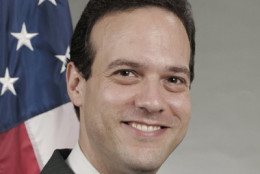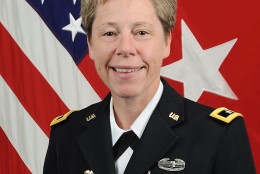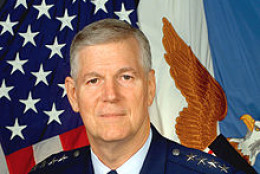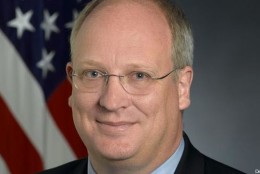Defense
-
The Government Accountability Office has concluded that an audit of the Marine Corps’ 2012 financial statements - previously issued by the Defense Department’s inspector general - was riddled with problems, including missteps by the DoD IG itself.
August 05, 2015 -
The Army Reserve wants to make sure its soldiers aren’t relegated to the military’s B-team – called on only in case of emergency. But to do that, it needs to make sure its servicemembers are constantly training in their specialties, something that’s increasingly difficult under constrained budgets. As Federal News Radio’s Jared Serbu reports, the Reserve is looking to dramatically lower its training costs through public-private partnerships.
August 04, 2015 -
President Obama wants to build one of the fastest supercomputers ever in the next 15 years. The exascale computer would run about 30 times faster than today's fastest supercomputer. It's part of the National Strategic Computing Initiative in collaboration with the Energy Department, Pentagon, and National Science Foundation. Simon Szykman is the chief technology officer for Attain's federal services division and former chief information officer at the Commerce Department. He tells In Depth with Francis Rose that the project might not live up to all the hype.
August 04, 2015 -
The Coast Guard celebrates its 225th birthday this year. View our photo gallery to see how it's celebrating.
August 04, 2015 -
The Senate has confirmed Marine Corps Gen. Joseph Dunford to be the next chairman of the Joint Chiefs of Staff. Air Force Gen. Paul Selva will be the new vice chairman. It's the first time in 32 years all members of the Joint Chiefs of Staff are turning over within a year. Nora Bensahel is a distinguished scholar in residence at American University's School of International Service, and a nonresident senior fellow at the Atlantic Council. She tells In Depth with Francis Rose about her recommended reading list for the incoming Joint Chiefs of Staff.
August 03, 2015 -
In this episode, Women of Washington hosts Aileen Black and Gigi Schumm interview Brig. Gen. Tammy Smith, Deputy Chief of Staff for the Army Reserve.
August 03, 2015 Senior leaders from the departments of Defense and Veterans Affairs have been increasingly vocal in recent weeks about the work they have been doing over the past two years to achieve interoperability in the absence of a common electronic health record, vowing that they can meet Congress’ goal of health data interoperability without actually using the same software.
August 02, 2015-
The Defense Department's nuclear forces arsenal is getting a close look for affordability. Think tanks like the Government Accountability Office and even the Pentagon itself are all looking at how much money the agency should spend on nuclear stock. Todd Harrison is senior fellow for defense budget studies at the Center for Strategic and Budgetary Assessments. He tells In Depth with Francis Rose why he thinks it's important to look at nuclear forces in the context of the whole weapons inventory.
July 31, 2015 -
Marine Corps Gen. Joseph Dunford will be the new chairman of the Joint Chiefs of Staff. He'll begin his term October first when the current chairman — Army Gen. Martin Dempsey — retires. Retired Air Force Gen. Richard Myers was chairman of the Joint Chiefs of Staff from 2001 to 2005. He tells In Depth with Francis Rose about the challenges he walked into on his first day as chairman and how they might compare to what Dunford has on his plate.
July 31, 2015 -
Leidos wins a $4.3 billion contract for a new electronic health record from the Pentagon. The acquisition process started two years ago after three draft RFPs, and three potential bidders dropped out or were eliminated. Dave Wennergren is vice president of technology at the Professional Services Council and former assistant deputy chief management officer at the Defense Department. He tells In Depth with Francis Rose that this project is a very big deal.
July 30, 2015 -
The Department of Defense is seeing an increase in its projected IT spending for 2016 for the first time in 3 years. The increase is small at 1.6 percent but that's an extra half a billion dollars. Shawn McCarthy is the Research Director at IDC Government Insights. He tells In Depth with Francis Rose where that half a billion could be going.
July 30, 2015 -
The Pentagon capped off a more than two-year acquisition process for a new electronic health record today, awarding the contract to a consortium of companies led by Leidos. The new system will eventually roll out to more than a thousand sites around the world. It will replace DoD’s aging records system with a mostly-commercial IT product. More from Federal News Radio’s DoD reporter Jared Serbu.
July 29, 2015 -
After nearly 20 years of development, the Marine Corps said its first squadron of F35B joint strike fighters is just about ready for combat. It's the first joint strike fighter model to reach initial operational capability and the Defense Department spends nearly $100 billion in the process so far. Jim Hasik is a senior fellow at the Brent Scowcroft Center on International Security at the Atlantic Council. He tells In Depth with Francis Rose what the Pentagon could have spent its money on instead.
July 29, 2015 -
The Pentagon capped off a more than two-year acquisition process for a new electronic health record Wednesday afternoon, awarding a $4.3 billion contract to a consortium of companies led by Leidos.
July 29, 2015 -
Federal News Radio Executive Editor Jason Miller is reporting this week from the National Contract Management Association’s World Congress in Dallas. He reports on CDC contracting, GSA's FedSIM program and the current status of DoD's new services acquisition policy.
July 29, 2015












